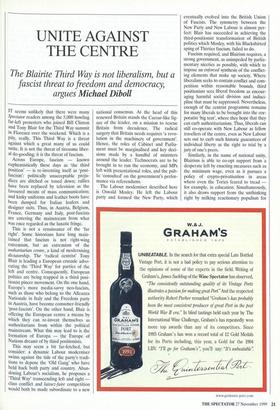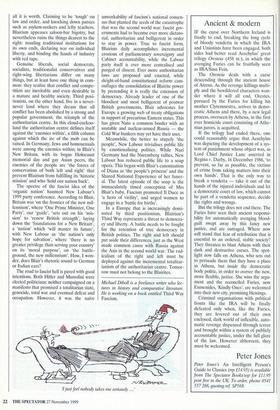UNITE AGAINST THE CENTRE
The Blairite Third Way is not liberalism, but a fascist threat to freedom and democracy, argues Michael Diboll
IT seems unlikely that there were many Spectator readers among the 5,000 howling far-left protesters who joined Bill Clinton and Tony Blair for the Third Way summit in Florence over the weekend. Which is a Pity, really. This Third Way is a threat against which a great many of us could unite. It is not the threat of tiresome liber- al do-gooding; it is the threat of fascism.
Across Europe, fascism — known euphemistically these days as 'the third position' — is re-inventing itself as `post- fascism': politically unacceptable preju- dices are ditched or toned down; rallies have been replaced by television as the favoured means of mass communication; and kinky uniforms and leather boots have been dumped for Italian loafers and designer suits. Thus, in Austria, Belgium, France, Germany and Italy, post-fascists are entering the mainstream from what was once regarded as the lunatic fringe.
This is not a renaissance of the 'far right'. Some historians have long main- tained that fascism is not right-wing extremism, but an extremism of the authoritarian centre, a kind of modernising dictatorship. The 'radical centrist' Tony Blair is leading a European crusade advo- cating the 'Third Way' for parties of the left and centre. Consequently, European politics are being trapped in a third posi- tionist pincer movement. On the one hand, Europe's more media-savvy neo-fascists, such as those who belong to the Alleanza Nationale in Italy and the Freedom party in Austria, have become consumer-friendly 'post-fascists'. On the other hand, Blair is offering the European centre a means by which they can re-invent themselves as authoritarians from within the political mainstream. What this may lead to is the formation of Europa — the Europe of Nations dreamt of by third positionists.
This may seem a bit far-fetched, but consider: a dynamic Labour moderniser swims against the tide of the party's tradi- tions to depose the 'Old Gang' who have held back both party and country. Aban- doning Labour's socialism, he proposes a 'Third Way' transcending left and right — class conflict and laissez-faire competition would both be made subordinate to a new
national consensus. At the head of this renewed Britain stands the Caesar-like fig- ure of the leader, on a mission to rescue Britain from decadence. The radical surgery that Britain needs requires 'a revo- lution in the machinery of government'. Hence, the roles of Cabinet and Parlia- ment must be marginalised and key deci- sions made by a handful of ministers around the leader. Technocrats are to be brought in to run the economy, and MPs left with presentational roles, and the pub- lic 'consulted' on the government's perfor- mance via referendums.
The Labour moderniser described here is Oswald Mosley. He left the Labour party and formed the New Party, which eventually evolved into the British Union of Fascists. The symmetry between the New Party and New Labour is almost per- fect: Blair has succeeded in achieving the third-positionist transformation of British politics which Mosley, with his Blackshirted aping of Thirties fascism, failed to do.
Fascism required, and Blairism requires, a strong government, as unimpeded by parlia- mentary niceties as possible, with which to impose an enforced synthesis of the conflict- ing elements that make up society. Where liberalism seeks to contain conflict and com- petition within reasonable bounds, third positionism sees liberal freedom as encour- aging harmful social division and indisci- pline that must be suppressed. Nevertheless, enough of the centrist programme remains for many liberals to be brought into the cor- poratist 'big tent', where they hope that they can curb authoritarianism. Thus, liberals can still co-operate with New Labour as fellow travellers of the centre, even as New Labour sets out to curb such historic guarantees of individual liberty as the right to trial by a jury of one's peers.
Similarly, in the name of national unity, Blairism is able to co-opt support from a desperate left by enacting measures such as the minimum wage, even as it pursues a policy of crypto-privatisation in areas where even the Tories feared to tread — for example, in education. Simultaneously, it also draws support from the unthinking right by milking reactionary populism for all it is worth. Claiming to be 'tough' on law and order, and knocking down patsies such as asylum-seekers and lefty teachers, Blairism appeases saloon-bar bigotry, but nevertheless ruins the things dearest to the right: mauling traditional institutions for its own ends, declaring war on individual liberty, and binding the hands of industry with red tape.
Genuine liberals, social democrats, socialists, traditionalist conservatives and right-wing libertarians differ on many things, but at least have one thing in com- mon: they realise that conflict and compe- tition are inevitable and even desirable in a mature and healthy society. Third posi- tionists, on the other hand, live in a never- never land where they dream that all conflict has been abolished by a strong and popular government, the triumph of the authoritarian centre. In this cloud-cuckoo- land the authoritarian centre defines itself against the 'enemies within', a fifth column against which the ire of the mob can be raised. In Germany, Jews and homosexuals were among the enemies within; in Blair's New Britain, with its bogus Holocaust memorial day and gay Asian peers, the enemies of the people are 'the forces of conservatism of both left and right' that prevent Blairism from fulfilling its 'historic mission' and who 'hold our nation back'.
The spectre of the fascist idea of the 'organic nation' haunted New Labour's 1999 party conference. According to Blair, Britain was 'on the frontier of the new mil- lennium', where 'One Prime Minister, One Party', our 'guide', 'sets out on his 'mis- sion' to 'renew British strength', laying down the 'foundations for a New Britain', a 'nation' which 'will master its future', with New Labour as 'the nation's only hope for salvation', where 'there is no greater privilege than serving your country' on its 'moral purpose', on 'the battle- ground, the new millennium'. How, I won- der, does Blair's rhetoric sound to German or Italian ears?
The road to fascist hell is paved with good intentions. Both Hitler and Mussolini were elected politicians; neither campaigned on a manifesto that promised a totalitarian state, genocide, total war and eventual defeat and occupation. However, it was the naive
unworkability of fascism's national consen- sus that planted the seeds of the catastrophe that was the second world war: fascist gov- ernments had to become ever more dictato- rial, authoritarian and belligerent in order to stay in power. True to fascist form, Blairism daily accomplishes incremental erosions of parliamentary sovereignty and Cabinet accountability, while the Labour party itself is ever more centralised and purged of dissent. Ever more authoritarian laws are proposed and enacted, while sleight-of-hand constitutional reform cam- ouflages the consolidation of Blairite power by pretending it is really the extension of democracy. Already leader of one of the bloodiest and most belligerent of postwar British governments, Blair advocates for Europe a growing web of treaty obligations in support of precarious Eastern states. This has given Nato a common border with an unstable and nuclear-armed Russia — the Cold War bunkers may yet have their uses.
Meanwhile, the better to stupefy 'the people', New Labour trivialises public life by emotionalising politics. While Nazi Germany had the Nuremberg rallies, New Labour has reduced public life to a soap opera. This began with Blair's canonisation of Diana as 'the people's princess' and the Shared National Experience of her funer- al. The latest episode of the soap is the immaculately timed conception of Mrs Blair's baby. Fascism promoted II Duce as 'a hero of virility', and urged women to engage in a 'battle for births'.
In a Europe that is increasingly domi- nated by third positionism, Blairism's Third Way represents a threat to democra- cy and liberty. A battle needs to be fought for the retention of true democracy in British politics. The right and left should put aside their differences, just as the West made common cause with Russia against the Axis in the second world war. The rad- icalism of the right and left must be deployed against the incremental totalitar- ianism of the authoritarian centre. Tomor- row must not belong to the Blairites.
Michael Diboll is a freelance writer who lec- tures in history and comparative literature. He is working on a book entitled Third Way Fascism.
'I just feel nobody takes me seriously...'



























































































 Previous page
Previous page